The phrase memory lane is often used to describe a nostalgic journey back into the past, where memories come alive in vivid detail. When someone talks about taking a walk down memory lane, they usually mean recalling fond or significant moments from earlier times. This expression resonates with many because it captures the bittersweet joy of revisiting personal history.
Understanding memory lane goes beyond just its literal meaning. It reflects the human desire to remember and cherish moments that shaped our lives. Whether through stories, photographs, or conversations, walking down memory lane is a powerful way to connect with our past and reflect on experiences that define who we are.
What Does Memory Lane Really Mean?
The meaning of memory lane is tied closely to nostalgia and reminiscence. It refers to the imaginary path one takes when recalling memories, often positive or sentimental ones. This idiomatic expression invites people to pause and reflect on the moments that brought happiness or meaning, sometimes bringing a tear or a smile.
This phrase has been used in literature, music, and everyday speech for decades, becoming a universal way to express the act of looking back fondly. The origin of memory lane likely stems from the idea of a street lined with memories, each step representing a different episode in life’s journey.
How to Use Memory Lane in Everyday Language
In everyday conversations, memory lane is a versatile phrase that fits many contexts. People might say, “Let’s take a trip down memory lane,” to suggest sharing stories from the past. It is commonly used when discussing childhood, old friends, or significant life events that still hold emotional weight.
Using memory lane in writing or speech adds warmth and relatability. It can also appear in formal and informal settings, though it’s most popular in casual speech. Writers often use it to evoke nostalgia, making their message more engaging and personal. Correct usage involves pairing the phrase with a sense of reflection or storytelling.
The Influence of Memory Lane in Popular Culture

The term memory lane has inspired countless creative works, including songs, movies, and books. Popular music often references walking down memory lane as a metaphor for revisiting past relationships or important moments. Films titled “Memory Lane” explore themes of friendship, growth, and reminiscence, underlining the phrase’s emotional power.
In art and literature, memory lane acts as a symbol for the human connection to time and experience. The phrase invites audiences to reflect on their own histories while appreciating the shared nature of memory. This cultural impact keeps memory lane relevant across generations and media formats.
Related Concepts Connected to Memory Lane
While memory lane focuses on nostalgic reflection, several related memory concepts enrich our understanding of the past. For example, memory foam products metaphorically relate to memory by retaining shape, symbolising how memories can leave lasting impressions. Meanwhile, memory loss and short term memory loss highlight the fragility of human recall.
Other terms like eidetic memory and photographic memory describe exceptional ability to remember details vividly, contrasting with the more emotional and subjective nature of memory lane. Digital storage devices such as memory sticks or Nintendo Switch memory cards also remind us how memory extends beyond the mind into technology, preserving moments in new ways.
The Role of Modern Technology and Memory Lane
Today, the concept of memory lane extends into the digital world, where memories are stored and shared through apps and social media. Tools like smart photo frames or memory preservation apps help people curate and revisit their own memory lane easily, blending nostalgia with modern convenience.
This digital age changes how we experience and share memories, allowing a wider community to join us on our personal journeys. Despite advances, the emotional core of memory lane remains the same—connecting with the past to better understand the present.
Conclusion on Memory Lane and Its Importance
In conclusion, memory lane is much more than just a phrase; it is a doorway to our personal histories and emotions. Using this expression allows us to embrace nostalgia and celebrate the moments that have shaped us. Whether through conversation, culture, or technology, walking down memory lane enriches our lives by reminding us of where we’ve come from.
Cherishing memories and sharing them helps maintain connections across time and generations. By understanding and using the phrase memory lane thoughtfully, we keep alive the power of reflection and the joy of remembrance.
You may also read: Relationship with Des O’Connor: A High-Profile Chapter

